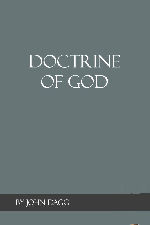Handbook of Ethics.
by Archibald Alexander
(1914)
This is a book on Christian ethics. Some of the topics in this book are Ethic, aesthetics, Socrates, Determinism, Spontaneity, Optimism, Pragmatism, Activism, and Vitalism.
CHAPTER I
THE NATURE AND SCOPE OF ETHICS…………… 9
I. General Definition. II. Distinctive Features–1. Ideal; 2. Norm; 3. Will. III. Is Ethics a Science? IV. Relation to–1. Logic; 2. Aesthetics; 3. Politics. V. Dependence upon–1. Metaphysics; 2. Psychology.
CHAPTER II
THE POSTULATES OF CHRISTIAN ETHICS…………. 22
I. Philosophical Ethics. II. Dogmatics. III. Theological Presuppositions– 1. Christian Idea of God. 2. Christian Doctrine of Sin. 3. Human Responsibility. IV. Authority and Method.
CHAPTER III
ETHICAL THOUGHT BEFORE CHRIST…………… 36
I. In Greece and Rome–Socrates, Plato, Aristotle, Stoics. Stoicism and St. Paul. II. In Israel–1. Law; 2. Prophecy; 3. Poetry. Preparatory Character of pre-Christian Morality.
SECTION B–PERSONALITY
CHAPTER IV
THE ESTIMATE OF MAN……………….. 55
I. Conflicting Views of Human Nature– 1. Man by nature Morally Good. 2. Man by nature Totally Depraved. 3. The Christian View. II. Examination of Man’s Psychical Nature– 1. The Unity of the Soul. 2. The Divine in Man. 3. The Physical and Mental Life. III. Appeal of Christianity to the Mind.
CHAPTER V
THE WITNESS OF CONSCIENCE…………….. 68
I. Treatment of Conscience– 1. In Greek Poetry and Philosophy. 2. In Old Testament. 3. In New Testament. II. Nature and Origin of Conscience– 1. Intuitionalism. 2. Evolutionalism. III. Validity of Conscience– 1. The Christian View. 2. The Moral Imperatives. 3. The Permanence of Conscience
CHAPTER VI
‘THE MIRACLE OF THE WILL‘…………….. 82
Is Man free to choose the Good? Creative Power of Volition. Aspects of Problem raised. I. Scientific– Man and Physical Necessity. II. Psychological– Determinism and Indeterminism. Criticism of James and Bergson. Spontaneity and Necessity. III. Theological– Divine Sovereignty and Human Freedom. Jesus and Paul–Challenge to the Will. Freedom–a Gift and a Task.
SECTION C–CHARACTER
CHAPTER VII
MODERN THEORIES OF LIFE……………… 99
I. Naturalistic Tendency– 1. Materialistic– (1) Idyllic or Poetic–Rousseau. (2) Philosophic–Feuerbach. (3) Scientific–Haeckel. 2. Utilitarian–Hobbes, Bentham, Mill. 3. Evolutionary–Spencer. 4. Socialistic–Marx, Engels. 5. Individualistic– (1) Aestheticism–Goethe, Schiller. (2) Subjectivism– (a) Pessimism–Schopenhauer. (b) Optimism–Nietzsche. II. Idealistic Tendency– 1. Kant–Categorical Imperative. 2. Fichte and Hegel–Idea of Personality. 3. James–Pragmatism. 4. Bergson–Vitalism. 5. Eucken–Activism.
CHAPTER VIII
THE CHRISTIAN IDEAL………………. 127
Life, as the highest Good. I. Life, in its Individual Aspect– 1. Its Intensity. 2. Its Expansion. 3. ‘Eternal Life.’ II. Life, in its Social Aspect– 1. ‘The Kingdom of God’– Eschatological Interpretation. Untenableness of Interimsethik. 2. Christ’s View of Kingdom– (1) A Present Reality–a Gift. (2) A Gradual Development–a Task. (3) A Future Consummation–a Hope. III. Life, in its Godward Aspect– 1. Holiness. 2. Righteousness. 3. Love.
CHAPTER IX
STANDARD AND MOTIVE……………….. 146
I. Christ as Example– 1. Portrayal by Synoptists– (1) Artlessness of Disciples. (2) Naturalness of Jesus, 2. Impression of Power– (1) Power of Loyalty to Calling. (2) Power of Holiness. (3) Power of Sympathy. 3. Value of Jesus’ Example for Present Life– Misconception of Phrase ‘Imitation of Christ.’ II. The Christian Motive– 1. Analysis of Springs of Conduct– (1) Divine Forgiveness. (2) Fatherhood of God. (3) Sense of Vocation. (4) Brevity of Life. (5) Idea of Immortality. 2. Question as to Purity of Motive– (1) Charge of Asceticism. (2) Charge of Hedonism. 3. Doctrine of Rewards– (1) In Philosophy. (2) In Christianity–(a) Jesus; (b) Paul.
CHAPTER X
THE DYNAMIC OF THE NEW LIFE……………. 164
I. Divine Power– Operative through Christ’s 1. Incarnation and Life. 2. Death and Sacrifice. 3. Resurrection and Indwelling Presence. II. Human Response– 1. Repentance– (1) Contrition–Confession–Resolution. (2) Question of ‘Sudden Conversion.’ (3) ‘Twice Born’ or ‘Once Born.’ 2. Faith– (1) In Ordinary Life. (2) In Teaching of Jesus. (3) The Pauline Doctrine. 3. Obedience– (1) Active Appropriation of Grace. (2) Determination of Whole Personality. (3) Gradual Assimilation.
SECTION D–CONDUCT
CHAPTER XI
VIRTUES AND VIRTUE………………… 183
Definition of Virtue. I. The Natural Basis of the Virtues– ‘The Cardinal Virtues.’ II. The Christian Transformation of the Virtues– 1. The New Testament Account. 2. Cardinal Virtues, Elements of Christian Character. 3. Place of Passive Virtues in Life. III. The Unification of the Virtues– 1. Unity in Relation to God. 2. Love, Spring of all Virtues, 3. ‘Theological Virtues,’ Aspects of Love.
CHAPTER XII
THE REALM OF DUTY………………… 199
I. Aspects of Duty– 1. Duty and Vocation. 2. Conflict of Duties– (1) Competing Obligations. (2) ‘Counsels of Perfection.’ (3) Indifferent Acts. 3. Rights and Duties– (1) Claim of ‘Natural Rights.’ (2) Based on Worth of Individual. (3) Christian Idea of Liberty. II. Spheres of Duty– 1. Duties in Relation to Self– (1) Self-Respect. (2) Self-Preservation. (3) Self-Development– Self-regarding Duties not prominent in Scripture. Self-Realisation through Self-Sacrifice. 2. Duties in Relation to Others– (1) Regard for Man: Brotherly Love– (a) Justice. (b) Veracity. (c) Judgment. (2) Service– (a) Sympathy. (b) Beneficence. (c) Forgiveness. (3) Example and Influence. 3. Duties in Relation to God– (1) Recognition. (2) Obedience–Passive and Active. (3) Worship–Reverence, Prayer, Thanksgiving.
CHAPTER XIII
SOCIAL INSTITUTIONS………………. 230
I. The Family– 1. Origin and Evolution of Family. 2. Christian view– (1) Christ’s Teaching on Marriage. (2) State Regulation and Eugenics. (3) Tendencies to Disparagement. 3. Family Relationships– (1) Parents and Children. (2) Woman’s Place and Rights. (3) Child Life and Education. II. The State– 1. Basis of Authority– Tolstoy and Anarchism. ‘Social Contract.’ 2. State, in New Testament. 3. Modern Conceptions– Views of Augustine and Hegel. (1) Duty of State to Citizens. (2) Duty of Citizens to State. (3) The Democratic Movement– Reciprocity of Service and Sense of Brotherhood. III. The Church– 1. Relation of Church and State. 2. Purpose and Ideal of Church– (1) Worship and Edification. (2) Witness to Christ. (3) Evangelisation of Mankind. 3. The Church and the Social Problem– (1) Christ’s Teaching as to Industry and Wealth. (2) Attitude of Early Church to Society. (3) Of Roman and Reformed Churches. 4. Duty of Christianity to the World– The Missionary Imperative and Opportunity.
CHAPTER XIV
CONCLUSION–THE PERMANENCE OF CHRISTIAN ETHICS……. 245
BIBLIOGRAPHY…………………… 248
INDEX……………………… 263
Post Views: 130
 Divine use of Sickness
Divine use of Sickness

Dagg Doctrine of God is a 14 chapter work on the Person of God, His existence, His Attributes, which are Unity, Spirituality, Omnipresence, eternity, immutability, Omniscience, Omnipotence, Goodness, Truth, Justice, Holiness, Wisdom.
PDF: Dagg Doctrine of God
theWord: Dagg Doctrine of God
MySword: Dagg Doctrine of God
eSword: Dagg Doctrine of God
CP34 Divine use of Sickness
Read this tract by Pastor Cox about the divine use of sickness explains how God works with sickness to remind man of his limited time on earth, the consequences of sin, etc.
In this tract Pastor Cox explains how God positively uses sickness to help us turn our thoughts and attention to the eternal. We get so involved in our daily lives sometimes that we forget that our life is but a vapor on this earth, soon to no longer be. God uses sickness as a severe warning that our time is running out, and we need to live as though every moment has a forward view towards eternity. How we spend our life is important.
Sections:
1. Understanding that God is God
2. Sickness because of Sin
3. Warning about approaching Death
4. Warning about Human weakness
5. The Error of the Sick
6. God listens to those who ask in sincerity
Job 13:15 Though he slay me, yet will I trust in him: but I will maintain mine own ways before him.
There is an attitude within much of Christianity that sickness in any form is bad, and God does not have anything to do with it. For these Christans, they ask God to take the sickness away, and sometimes (as though it was their right to be health) that they demand God to remove their sickness. The reality of life is that they continue ill, and many have a crisis of faith over this. For them, God is impotent, or God does not love them. In other words, their confidence, faith, and love of God depends on God always sending them good things. But this is not how the Bible indicates life is. God uses calamity and sickness for His own purposes and we have to understand this (and accept it).
Please support our tract ministry by donating on the tract website (see sidebar). Because of your donations we can offer these tracts online, and for free.
Read the Tract CH34
Please donate on sidebar to help support this website.
MySwordmodules is a website dedicate to the MySword Bible Program for Androird devices. We host MySword Modules.

Donate to David Cox Ministries I have 34 websites, about half in English and half in Spanish. All of these sites are either religious blogs or sites specifically to support and offer free modules for Bible Software. Some of them have over 1000 free religious books for Bible study. I have to pay for all of this somehow, and most months, the entire amount of all websites are on my shoulders alone.
Please donate something today!




there is no download link…
I added Alexander-Handbook of Christian Ethics link. Try it now. Thanks for bringing it to my attention.